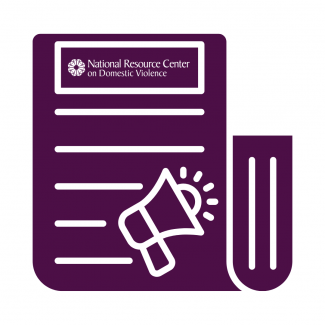This year marks the 30th anniversary since the passage of the Violence Against Women Act (VAWA) in 1994. VAWA is a landmark piece of legislation designed to address domestic violence, sexual assault, stalking, and other forms of gender-based violence. It has led to the creation of vital programs and services, including the establishment of the National Domestic Violence Hotline, funding for victim assistance programs, grants for law enforcement training, and streamlining the legal system’s response to survivors.
When VAWA was reauthorized in 2021, NRCDV issued a statement reflecting on the Act’s legacy:
“We hold the complexity of our current context. We sit with nearly three decades of uneven progress and harm-doing. NRCDV recognizes that some survivors still rely on the criminal legal system while many others want help for their partners apart from carceral responses. We also sit under the weight of systems’ interventions that consistently punish survivors and implement strategies that cause great harm under the guise of protection. Today, we reflect on the many BIPOC survivors who languish in prison after enduring sexual assault, domestic violence, racism, transphobia, ableism and many other forms of oppression.”
These sentiments continue to ring true today. As VAWA turns 30, we remain deeply grateful to lawmakers who fought for this legislation, as well as advocates past and present, for their work on behalf of survivors. While VAWA has made many important strides, there are still areas that need improvement and expansion. These include increasing access for marginalized communities, such as Black and brown people, LGBTQ+ individuals, Indigenous survivors, and immigrant survivors. Additionally, it’s important to address gaps in housing, legal representation, and economic justice for survivors, as well as needed expansion of prevention efforts – to stop violence before it ever occurs.
We are grateful for our legislative leaders and collaborative partners who stand with us in the fight for equity and justice. At the same time, we reflect on the legacy of three decades of support for and reliance on the United States’ criminal legal system, which has so deeply harmed Black and brown survivors, families, and communities. We know that part of dismantling white supremacy is honoring multiple truths. It is our hope, and our commitment, that we will work in solidarity to ensure that the next iteration of VAWA works to support all survivors and communities.
In 2021, NRCDV committed to intentionally expanding our policy efforts to focus on anti-violence work within a much larger context of social justice. This commitment is outlined in our policy stance:
- WE COMMIT to being expansive in our policy thinking, efforts, and focus on anti-violence work within the larger context of social justice and progressive world-building.
- WE COMMIT to co-creating policy solutions with survivors and communities most impacted by gender-based violence and sexual violence, and to address the root causes.
- WE COMMIT to advance policy solutions that will make meaningful change for Black and brown communities, trans and non-binary survivors, survivors with disabilities, immigrant survivors, and those most traumatized and harmed by carceral systems and responses.
As we move our work forward together, building on decades of domestic violence advocacy, NRCDV remains committed to co-creating a world that is free from violence, racism, and oppression for all.
For additional information, please contact Shenna Morris (she/her), NRCDV Vice President of Policy and Systems Change, at smorris@nrcdv.org.














